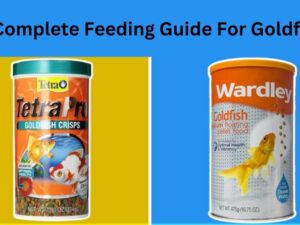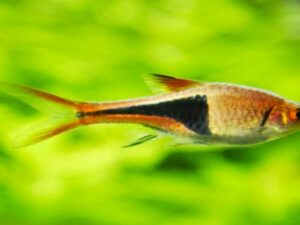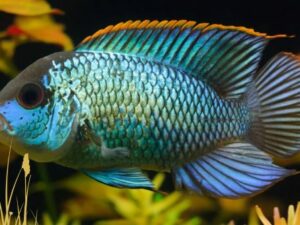Paradise fish are a type of fish native to East Asia like China & Vietnam. They are popular aquarium fish because of their bright colors and dynamic behavior.
There are several different species of paradise fish, but all share some common characteristics. Their unique colorful look is one of the things that makes paradise fish so popular in the aquarium trade.
They are a very active fish species and constantly swim around their tank. They are also very territorial and often attack other fish that invade their space.
This guide will discuss the care and keeping of paradise fish in more detail.
Table of Contents
- Species Summary
- Paradise Fish Care
- Tank Size
- Water Parameters
- Filtration
- Heater
- Lighting
- Aquarium Decorations
- Plants
- Filter Media
- Water Conditioner
- Cleaning The Tank
- Common Possible Diseases
- Preventing Diseases
- Paradise Fish Treatment And Medications Of Diseases
- Paradise Fish Food & Diet
- Paradise Fish Diet Foods To Avoid
- Paradise Fish Tank Mates
- Fish to Avoid In Tank
- Advantages Of Having Paradise Fish In Your Tank
- Disadvantages Of Having Paradise Fish In Your Tank
- Conclusion
Species Summary
| Scientific name: | Macropodus Opercularis |
| Common name: | Paradise fish |
| Family: | Osphronemidae |
| Origin: | East Asia, like China & Vietnam |
| Life span: | 8-9 years |
| Size: | 2.5 inches |
| Tank size: | 20 gallons minimum |
| pH range: | 5.8-8.0 |
| Temperature range: | 68°-82°Fahrenheit |
| Water Hardness: | Soft to medium |
| Water Type: | Freshwater |
| Tankmates: | Generally not recommended, can be aggressive |
| Temperament: | Active, territorial, can be aggressive |
| Breeding: | Egg layer |
| Food type: | Omnivorous, will eat most things offered |
They prefer shallow water with plenty of plants and hiding places. Although this is not a requirement, they will do best in an aquarium with plenty of live plants.
Due to their beauty, Paradise fish are a popular choice for aquariums. They were one of the first fish to be kept in aquariums. They are a hardy species that can adapt to a wide range of water conditions.
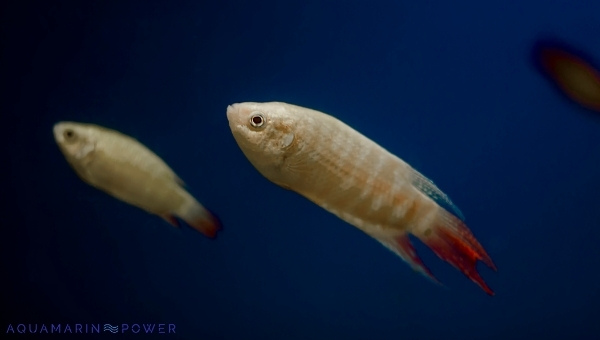
Unlike many other gouramis, paradise fish are very easy to care for. They do best in a moderately sized tank with plenty of live plants and dim lighting. Paradise fish are a popular choice for both beginner and experienced aquarists alike.
Paradise Fish Size & Growth Rate
Paradise fish can grow up to 2.5 inches in length. They are moderately sized fish and do well in a 20-gallon tank or larger.
They are an active fish species and will grow quickly if given enough space. It is important to provide them with plenty of room to swim and grow.
Paradise Fish Lifespan
The average paradise fish lifespan is 8-9 years. This assumes you’re providing a good home with proper care. They can live up to 10 years or more under the right conditions.
There have been some reports of paradise fish living for 12 years.
Paradise Fish Appearance
The appearance of paradise fish originally made them famous in the aquarium trade. They are very colorful fish and can come in various colors. The most common color is deep red, but it can also be blue, green, yellow, or purple.
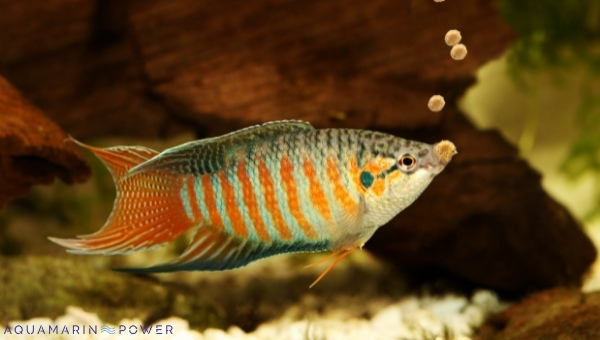
All paradise fish share some common characteristics. They have long, slim bodies and pointed heads. They also have a long dorsal fin that runs the length of their body.
Their dorsal and anal fins are also brightly colored and can be a different color than the rest of their body. You will often find a bright blue or red stripe at the very edge of these fins.
They have tiny little ventral fins and a long, flowing caudal fin. Their caudal fin is usually a different color than the rest of their body and is a key identifying feature.
Paradise fish have the classic “gourami” body type and are one of the most easily recognized fish in the aquarium trade.
Males and females look very similar, and it is often difficult to tell them apart. The easiest way to tell the difference is by looking at their ventral fins. Males will have a small, thin fin, while females will have a larger, more robust fin.
Paradise Fish Behavior & Temperament
Paradise fish are a great addition to any tank, but it is important to understand their behavior and temperament.
Some things to keep in mind when dealing with paradise fish include:
- They are a schooling fish: Paradise fish typically do best when in a school of at least 3-4 fish.
- They are timid fish: Paradise fish are typically timid fish and maybe scared or stressed in a new environment.
- They require plenty of hiding places: Paradise fish require plenty of hiding places to feel safe and secure.
- They are tropical fish: Paradise fish require a warm water temperature of at least 74 degrees Fahrenheit.
By understanding their behavior and temperament, you can help to ensure that your paradise fish are happy and healthy.
Paradise Fish Breeding
Paradise fish are an excellent choice for breeding fish because they are easy to care for and prolific. You’ll need a breeding tank with at least 20 gallons and a good filter. The tank should be filled with fresh water and heated to 68°-82°Fahrenheit. You’ll also need to provide some hiding places for the fry to hide in.
The breeding process begins when the male fish starts to chase the female fish around the tank. The eggs are then released and will sink to the bottom of the tank. The eggs will hatch in about 3 days, and the fry will become free-swimming a few days later. The fry can be fed a variety of foods, including baby brine shrimp, crushed flake food, and liquid fry food.
By providing a healthy environment and proper food, you can help to ensure that your paradise fish will breed successfully.
Paradise Fish Care
Paradise fish care is rather easy, and most fish enthusiasts will have no problem keeping them. They do best in a planted tank with some driftwood or rocks for cover.
For the most part, they are a very hardy species and can adapt to a wide range of water conditions. So long as you keep their water clean and well-oxygenated, they should be fine. This will have a positive impact on their lifespan and overall health.
Tank Size
Paradise fish do well in a tank size of 20 gallons or larger. They are an active species and will need plenty of room to swim. If you don’t have a tank that is at least 20 gallons, you should consider another fish species.
If you want to keep a few of them, you will need a tank size of at least 30 gallons.
When setting up your tank, provide plenty of live plants and hiding places. They will feel more comfortable in an aquarium that has plenty of covers.
Water Parameters
Paradise gourami is hardy fish and can adapt to a wide range of water conditions. This is one of the parts of Paradise fish care that makes them so popular.
- pH Range: They can tolerate a pH range of 5.8-8.0
- Temperatures: They can tolerate a temperature range of 68°-82°Fahrenheit
- Ammonia levels: Paradise fish can handle ammonia levels up to 0.25 ppm
- Nitrite levels: They can control nitrite levels up to 0.5 ppm
- TDS Range: They can tolerate a TDS range of 100-500 ppm
- Water Hardness: They can endure a water hardness of up to 30 dGH
They can accept a little salt in their water, but keeping them in a saltwater tank is not recommended. And it is important to perform water changes regularly to keep your paradise fish healthy. It is recommended to change 20-25% of the water every week.
It is also important to keep their water clean and well oxygenated. You can use an air pump and air stone to help with this.
Filtration
When setting up your tank, it is important to use a good quality filter. A good quality filter will help to keep your water clean and healthy. It is recommended to use a filter with a turnover rate of at least 6 times per hour.
Some of the recommended filters are:
- The Aqua Clear 50: These filters are very popular and work well with various aquarium sizes. They have a high flow rate and can be used for fresh and saltwater tanks.
- The Aqua-Tech 20-40: This filter is perfect for smaller aquariums. It has a 20-40 gallon per hour flow rate and is great for tanks up to 55 gallons in size.
- The Marineland Emperor 400: This filter is perfect for larger aquariums. It has a flow rate of 400 gallons per hour and is great for 125 gallons in size tanks.
- The Fluval C2: This filter is perfect for planted tanks. It has a low noise rating and a high flow rate. It is also available in a variety of sizes to fit most aquariums.
- The Penn Plax Cascade 700: This filter is perfect for large aquariums. It has a flow rate of 700 gallons per hour and is great for tanks up to 350 gallons in size.
Heater
If you keep your paradise fish in a temperature range of 68°-82°Fahrenheit, you will need to use a heater. A good quality heater is important for keeping your fish healthy and happy.
Some of the recommended heaters are:
- The Finnex 500W Heater: This heater is perfect for larger aquariums. It has a wattage of 500 and is adjustable to fit most aquarium sizes.
- The Aqua heat 150W Heater: This heater is perfect for smaller tanks. It has a wattage of 150 and is adjustable to fit most aquarium sizes.
Lighting
Paradise fish require a moderate amount of light. They do not require a lot of direct sunlight, but they do need some light to thrive.
It is recommended to use fluorescent light or LED light for your aquarium. This will provide the right amount of light for your fish.
Some recommended lights are:
- The Aqueon LED Strip Light: This light is perfect for smaller aquariums. It is a great value and provides a variety of lighting options.
- The Finnex Ray II LED Aquarium Light: This light is perfect for larger tanks. It has a variety of settings and can be dimmed to create the ideal amount of light for your fish.
Aquarium Decorations
When decorating your aquarium, using plants and safe decorations for paradise fish is important. Some recommended decorations are:
- The Penn Plax Castle: This decoration is perfect for larger aquariums. It is made of non-toxic materials and safe for both fresh and saltwater tanks.
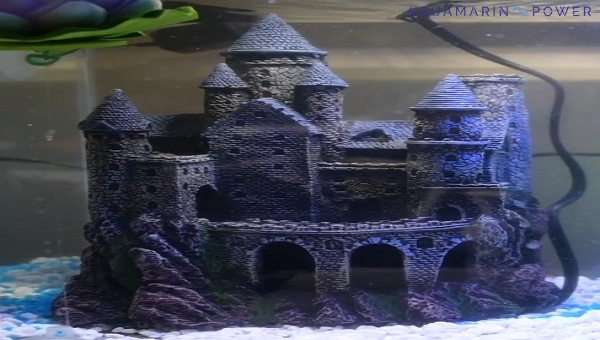
- The Marina Decoration: This decoration is perfect for smaller aquariums. It is made of non-toxic materials and safe for both fresh and saltwater tanks.
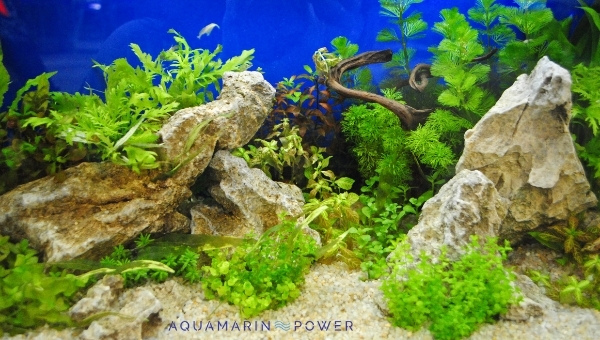
- The Penn Plax Bamboo Forest: This decoration is perfect for planted tanks. It is made of non-toxic materials and safe for both fresh and saltwater tanks.
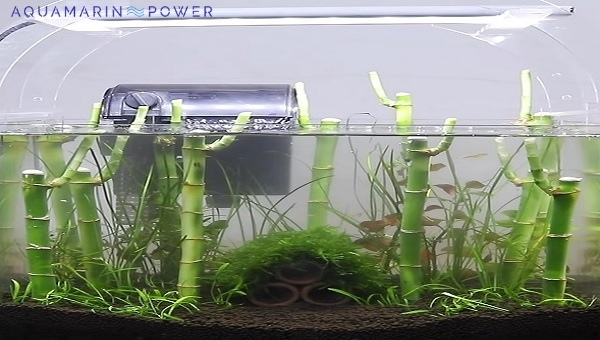
Plants
When choosing plants for your tank, it is important to select safe plants for paradise fish.
Some recommended plants are:
- The Anubias Nana Plant: This plant is hardy and easy to care for. It does not require a lot of light or water and is perfect for both beginners and experts alike.
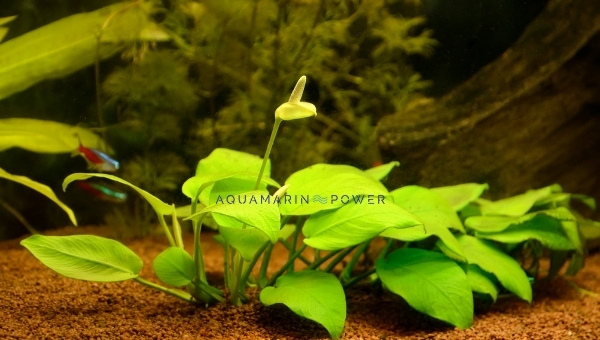
- The Amazon Sword Plant: This plant is hardy and easy to care for. It does not require a lot of light or water and is perfect for both beginners and experts alike.
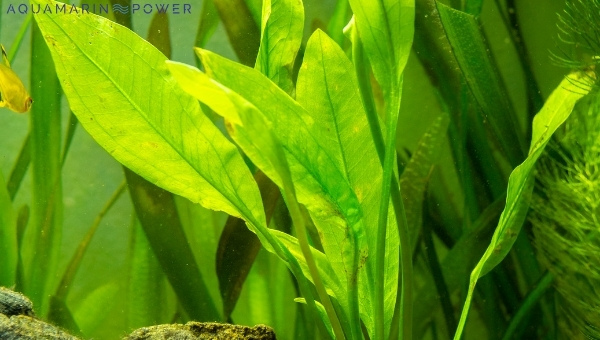
Filter Media
It is essential to use filter media when setting up your aquarium filter. Filter media helps to remove debris and waste from the water. It is recommended to use a variety of filter media in your filter, including activated carbon, ammonia remover, phosphate remover, and biological media.
Some recommended filter media are:
- The API Ammo Lock: This product is perfect for removing ammonia from the water. It is easy to use and comes in a variety of sizes.
- The Marineland PhosBan: This product is perfect for removing phosphate from the water. It is easy to use and comes in a variety of sizes.
- The Seachem Matrix: This product is perfect for biological filtration. It is easy to use and helps to remove debris and waste from the water.
Water Conditioner
It is important to use a water conditioner when setting up your aquarium. A water conditioner helps to remove harmful chemicals from the water and makes it safe for fish.
Some recommended water conditioners are:
- The API Stress Coat: This product is perfect for removing chlorine and chloramine from the water. It is easy to use and comes in a variety of sizes.
- The Seachem Prime: This product is perfect for removing chlorine, chloramine, and ammonia from the water. It is easy to use and comes in a variety of sizes.
Cleaning The Tank
It is important to clean your aquarium regularly. This helps to keep the water clean and healthy for your fish. It is recommended to clean your aquarium every two weeks.
Some recommended methods for cleaning your aquarium are:
- The Python No Spill Clean and Fill Aquarium Maintenance System: This system is perfect for cleaning and filling your aquarium. It is easy to use and comes with a variety of attachments.
- The Aquarium Gravel Vacuum: This vacuum is perfect for removing debris from the gravel in your tank. It is easy to use and comes with a variety of attachments.
- The Aquarium Filter Media Bag: This bag is perfect for removing debris from the filter media in your tank. It is easy to use and comes in a variety of sizes.
Common Possible Diseases
When it comes to paradise fish, it is important to be aware of the possible common diseases they can get. Several diseases can affect paradise fish.
Some common diseases are:
- The White Spot Disease: This disease is caused by a virus and is most commonly seen in young fish. It causes white spots to form on the body of the fish.
- The Ichthyophthirius Multifiliis: This disease is caused by a parasite and is most commonly seen in new tanks. It causes small white dots to form on the body of the fish.
- The Brooklynella hostilis: This disease is caused by bacteria and is most commonly seen in stressed fish. It causes reddish lesions to form on the body of the fish.
- The Velvet Disease: This disease is caused by a parasite and can lead to the death of your fish. It is easy to treat, but getting treatment as soon as possible is important.
Preventing Diseases
You can do many things to help prevent diseases from affecting your paradise fish.
Some things you can do are:
- Keep your tank clean: This helps to keep the water clean and healthy for your fish.
- Make sure your water conditions are correct: This helps to create a healthy environment for your fish.
- Quarantine new fish: New fish should be quarantined for at least two weeks before being added to your tank.
Paradise Fish Treatment And Medications Of Diseases
If your paradise fish does get sick, there are many treatments and medications available. Some common treatments are:
- The API Melafix: This product is a natural antibiotic that helps to treat several diseases.
- The API Pimafix: This product is a natural antifungal that helps treat many diseases.
- The Seachem Cupramine: This product is a copper-based medication that helps to treat
- multifiliis.
- The Seachem Metroplex: This product is a multi-purpose medication that helps to treat several diseases.
So, if you are lucky enough to have a paradise fish in your tank, be sure to take good care of it! By following the tips above, you can help to keep your fish healthy and happy.
Paradise Fish Food & Diet
It is important to provide them with a healthy diet when it comes to paradise fish. A healthy diet for paradise fish includes a variety of foods, such as:
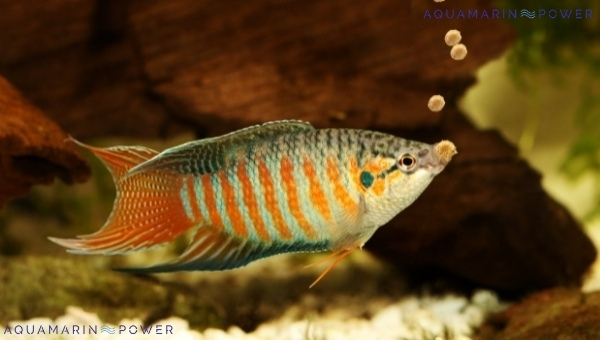
Live food: Live food is an excellent source of protein and can include things like:
- Brine shrimp: This is a common type of live food for fish.
- Daphnia: This is another common type of live food for fish.
- Mosquito larvae: This is an excellent source of protein for larger fish.
Frozen food: Frozen food is an excellent source of protein and can include things like:
- Frozen bloodworms
- Frozen brine shrimp
- Frozen daphnia
Dry food: Dry food is an excellent source of fiber and can include things like:
- Flakes: This is a common type of dry food for fish.
- Pellets: This is another common type of dry food for fish.
Vegetables: Vegetables are a great source of fiber and can include things like:
- Zucchini
- Broccoli
- Cucumber
So, a healthy diet for paradise fish includes a variety of foods, including live food, frozen food, and flake food. It is also important to have vegetables in your fish’s diet. By providing your fish with a healthy diet, you can help to keep them healthy and happy.
Paradise Fish Diet Foods To Avoid
There are a number of foods that you should avoid feeding your paradise fish.
Some of these foods include:
Unhealthy food: Unhealthy food can include things like:
- Chocolate: This is not healthy for your fish and can lead to serious health problems.
- Chips: This is also not healthy for your fish.
Greasy food: Greasy food can include things like:
- Fried food: This is not healthy for your fish and can lead to serious health problems.
- Butter: This is also not healthy for your fish.
Spicy food: Spicy food can include things like:
- Peppers: This is not healthy for your fish and can lead to serious health problems.
- Onion: This is also not healthy for your fish.
So, a few diet foods to avoid feeding your paradise fish are unhealthy food, greasy food, aerated food, and spicy food. By avoiding these foods, you can help to keep your fish healthy and happy.
Paradise Fish Tank Mates
Paradise fish are a great addition to any tank, but choosing the right tank mates is important.
Some good tank mates for paradise fish include:
- Gian danios: Gian danios are a great tank mate for paradise fish because they are a schooling fish and are very active.
- Bristlenose plecos: Bristlenose plecos are good for tank mates because they are peaceful and will not harass other fish.
- Neon tetras: Neon tetras are a great tank mate for paradise fish because they are a schooling fish and are very peaceful.
- Cory catfish: Cory catfish are a great tank mate for paradise fish because they are a bottom dweller and will scavenge for food.
- Synodontis catfish: Synodontis catfish are a great tank mate for paradise fish because they are peaceful and do not harass other tank mates.
- Danios: Danios are great tank mates for paradise fish because they are peaceful and do not harass other tank mates.
- Bala sharks: Bala sharks are peaceful fish that will not harass other tank mates.
- Guppies: Guppies are good for tank mates because they are peaceful and will not harass other fish.
- Angelfish: Angelfish are beautiful fish that will add color to your tank.
- Swordtails: Swordtails are suitable for tank mates because they are peaceful and will not harass other fish.
Fish that are their size or smaller are not recommended as tank mates because they may be harassed or bullied by the paradise fish. By choosing suitable tank mates, you can help to ensure that your paradise fish are happy and healthy.
Fish to Avoid In Tank
- Goldfish: Goldfish are not suitable for tank mates because they are not peaceful and will harass other fish.
- Other cichlids: Other cichlids are not suitable for tank mates because they are aggressive and can be very territorial.
- Oscars: Oscars are not a good choice for tank mates because they are also very aggressive and can be very territorial.
By avoiding these fish, you can help to keep your paradise fish safe and healthy.
Advantages Of Having Paradise Fish In Your Tank
- The first advantage of having paradise fish in your tank is that they are very beautiful fish. They come in a variety of colors, including blue, red, yellow, and black.
- The second advantage of having paradise fish in your tank is that they are very active fish. They will constantly swim around the tank and add movement to the aquarium.
- The third advantage of having paradise fish in your tank is that they are a schooling fish. This means that you can buy more than one fish and they will all school together.
- Fourth, paradise fish are peaceful and will not harass other fish in the tank. This makes them a good choice for a community tank.
- The fifth advantage of having paradise fish in your tank is that they are scavenger fish. This means that they will scavenge for food on the bottom of the tank. They will eat a variety of foods, including flake food, freeze-dried food, and live food.
Disadvantages Of Having Paradise Fish In Your Tank
- The disadvantage of having paradise fish in your tank is that they can be bullies. They will harass other fish in the tank that is their size or smaller.
- The second disadvantage of having paradise fish in your tank is that they can be very messy. They will produce a lot of waste, which can quickly foul the water in the tank.
- Another disadvantage of having paradise fish in your tank is that they can be very aggressive. They may bully other fish in the tank or even attack you when feeding them.
Conclusion
Paradise fish care is an exciting topic with many things to consider. By taking into account the pros and cons of having these fish in your tank, you can decide whether or not they are the right choice for you.
Thanks for reading!

